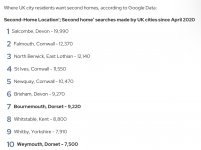Cardiffdaffs
Well-known member
Buy to lets of course is not a new phenomenon and neither is the slow trickle of locals away from towns with a desirable housing target. The London effect is now hitting the north because of a number of factors. Low interest rates, shortage of housing and of course post Covid the wish to change lifestyles.
I work occasionally as a consultant for a firm in the city and they have most employees working from home because, well, they can very effectively do what they need to do without jumping on a train. Instead of living in commutable properties to London they now want to go to more pleasant environments - mostly that means by the sea All they need is strong wifi.
So apart from the growing investment in second properties to let you have the purchase of bolt holes by the sea and they just as bad because they remain empty for periods in the year. Classic example of this is Lyme Regis in Dorset. Only the wealthy can own and live there now.

I work occasionally as a consultant for a firm in the city and they have most employees working from home because, well, they can very effectively do what they need to do without jumping on a train. Instead of living in commutable properties to London they now want to go to more pleasant environments - mostly that means by the sea All they need is strong wifi.
So apart from the growing investment in second properties to let you have the purchase of bolt holes by the sea and they just as bad because they remain empty for periods in the year. Classic example of this is Lyme Regis in Dorset. Only the wealthy can own and live there now.

